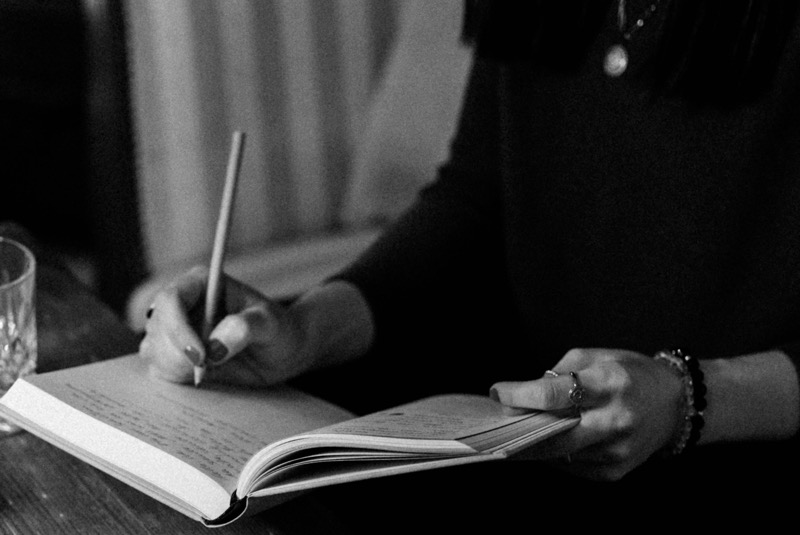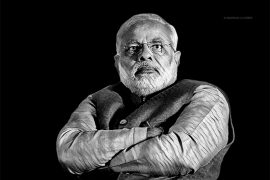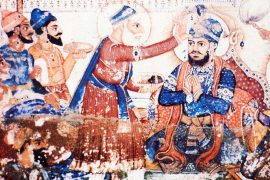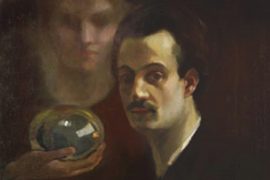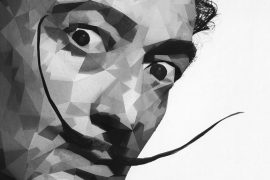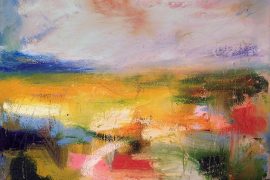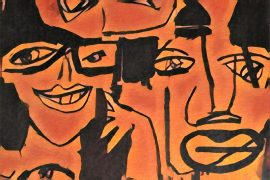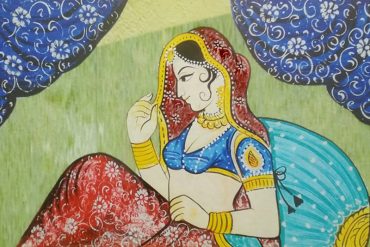Who can measure the heat and passion of a poet’s heart when it is caught and tangled in a woman’s body”? – Virginia Woolf: A Room of One’s Own
My literature notebooks glided with a very different arc, swept by a fierce, passionate gust; the world calls it ‘feminism.’ But while I started reading Virginia Woolf in the solemn reading hall of the library, in the crowded train compartments, in the quiet confines of my home, I met my own sweet, vulnerable wounds, coaxed from my shell of the feel-good romances of intelligent, charming heroines, celebrating their love for their men. The world in the early twentieth century, a heavy suitcase of patriarchal morals faltered in my young, volatile mind as I had my first encounter with these lines in her phenomenal collection of essays A Room of One’s Own: “A woman must have money and a room of her own if she is going to write fiction.”
With a slow, perceptive entry in Woolf ’s world and her depiction of women, I gradually knew Woolf ’s own travails as she pointed fingers at the small, almost negligible place of women in the estate of fiction. Woolf, the fiery, wrathful woman, the author openly stating the life of disorder and struggle that women as artists have to endure in their journey to establish themselves as the ‘shining beacons’ of humanity.
Fresh out of university, basking in the glory of these ‘shining beacons’ and my own spirit of rebellion, I have often felt the ‘heat and passion of a poet’s heart’ as I read Woolf in these lines: “There is no gate, no lock, no bolt that you can set upon the freedom of the mind”. I, a fledgling writer, silently, secretly adore my cherished privacy of writing, adore the ‘room of my own’, which I really do not have, craving to escape the monotony of a spiritually confined state, of which she had so strongly spoken in her work.
But, wait…when I look at my own small bookshelf tucked in a cozy corner, the cheaper, yet treasured paperbacks in Bengali staring at me, cutting me open with seething lines, don’t my own Bengali roots fuel my feral mind? Yes, Taslima Nasrin, the forbidden name in Bangladesh, living in anger, desperation and terror in various exiles—in Sweden, France, Belgium, United States, and finally, India, comes across, as the closest corollary to Woolf. How many times in these two decades, from 1994, when she came out with her novel Lajja (Shame), has she fallen foul of the country’s law? How many times has she been threatened to death and fled her country to stay in exile, for writing bitter, abusive accounts of her own life as well as the lives of her fictional female protagonists? In darkened corners of my room, decades back in time, I remember my younger, petite self, discovering the voice of a bruised, dismayed soul of a woman who questioned the Koran, explained her disgust for the religious hypocrisies inflicted on her since childhood. With a feeling of shock running down my veins, I read her banned memoirs Amar Meyebela (My Girlhood), Utal Hawa (Gusty Wind) and Kaw (Speak), seeped in her anguish that gave birth to the books. I remember my first encounter with her dark, sinister world and her spirit, writhing to break free. I saw through her eyes how her perceptions of Allah, the Almighty God changed, ceasing to be the quintessential saviour that her religious mother taught her to worship. I saw through her eyes how he came to be the entity depicted by the skewed belief of people belonging to her own community, people whom she could blame openly for the stupidities, endless cruelties inflicted on the women in Bangladesh, including herself.
But was it only her challenging questions at patriarchy in Bangladesh and her non-conformity to her traditional Islamic ideologies that sucked me into her world? Weren’t the harrowing stories of her emotional, physical and spiritual journey of gradually discovering herself tempting enough? In my own inner world, where the tectonic plates of my own womanhood, my own sexuality were shifting, albeit unknowingly, the unraveling of her sexuality amidst the tyrannical Islamic world of male domination mattered, deeply, truly. What was true to her in the war-stricken post-independence Bangladesh, mattered to me, decades after, in a stifling, constrained suburban home in West Bengal. It mattered, when she depicted her mother, grandmother, aunts, sisters and cousins—spending their days in the oven fire, cooking for their fathers, brothers, husbands, feeding their babies and lulling them to sleep, offering their backs to be slapped and kicked by the men of the house, in unquestioned servitude. It mattered, more than I could have envisioned, when I read these lines in her poem, ‘Happy Marriage’:
My life, like a sandbar/has been taken over by a monster of a man/Who wants my body under his control/so that, if he wishes, /He can spit in my face/slap me on the cheek, /Pinch my rear; so that, if he wishes, /He can rob me of the clothes/take my naked beauty in his grip;/So that, if he wishes/he can chain my feet, /With no qualms whatsoever whip me/chop off my hands, my fingers, /Sprinkle salt in the open wound/throw ground-up black pepper in my eyes, With a dagger can slash my thigh/can string me up and hang me (Translation into English: Carolyn Wright).”
As I secretly scribbled poems on my blossoming, bruised womanhood, I read and re-read a number of her poems, centered around the world of endless isolation, despair and thankless compromises. In almost all of them she sees her own life, her trials, tribulations, the execution threats inflicted upon her by Islam extremists time and again as metaphors of the suppression of her wishes, the regulation of her steps. I read her journey and her voice lingered along with the other dynamic female writers of the Diaspora. Her tales and memoirs, looming like strange, indomitable shadows, merged in my head with the voices of Pakistani author Fatima Mernissi, the Indian poet Kamala Das, the fearless western literary figures, Alice Walker and Maya Angelou. Their eyes and their ears, prying on locked doors of shattered girlhoods, prying on slavery and its excruciating anguish sliced through my being. I sat, pensive and forlorn, thinking of myself as a woman, an entity freed from race, class and society, thinking of these women, and their harrowing journeys in a reign of silence, terror and slavery. For the umpteen times I read on, my own religious traditions whipped me hard, as I stumbled on the world of their tremendous physical and emotional pain within the periphery of those traditions.
“Are you reading Taslima? Do you really like reading her?” A woman asked me inside a train compartment.
“Yes, why?” I replied.
“Have you ever thought how a woman can be so shameless, open and ostentatious to write about her womanhood in such a way”? She questioned, with a visible air of indignation.
In the local train that meandered slowly through the sleepy suburban landscape of Kolkata, I smiled to myself. I was thinking of the stunning courage and ire of a woman writing her world, a woman groping in the darkness of pronounced sexism and the diktats of the Islamic clergymen, a woman writing in a sedate Bengali literary world where it was so easy to label her as a ‘slut.’
But hadn’t we crossed it all, long back, the brutal era of anarchy of post-partition, the turbulent times when questions regarding the spiritual freedom of women were considered sacrilege? Hadn’t we all, products of the hegemonic traditional middle-class Bengali families stepped out from our vain worlds to break the barriers, the baggage of our so-called ‘independence’ hanging heavy on our shoulders?
Yes, however much me and my women friends enjoyed watching ‘Paroma,’ the Bengali movie of the 80’s and the intense sexuality of a woman, however much we read texts that depicted the physical and emotional redemption of a woman, we, as a clan, still hated to know a gusty woman, and loved to call her ‘loose’. However much I felt one with the woman crusading against mindless arranged marriages, against the death of women following botched abortions, against the endless encounters with sexual abuse in her own family, the culture of shaming a woman was rampant. There I was, fumbling in this vast tide of intolerance. It was not only the intolerance against a woman who questioned the validity of the Shariyat (Islamic laws) based upon the clergy’s readings of the holy Koran, the intolerance against a woman who discovered redemption outside the long-built pillars of patriarchy as a forbidden thought. It was, as I pondered, an intolerance against her expressions that challenged a legacy of lies, a legacy of discrimination nurtured through centuries.
I read through the stunning, rebellious lines her memoirs, Amar Meyebela (My Girlhood), Kaw (Speak), astonished, mortified, not only to discover the ruthless extremism of the Mullah’s (clergymen), subjecting the women, children, the ethnic and religious minorities to brutality and terror, but to confront the attitudes of several women who joined in the ruthless effort to perpetuate fear and violence against other women. A nexus which still reminds me of these lines from Taslima’s poem ‘Shashon’ (Censuring): “Ashole bhool jonmo niye apobitro deshe” (My birth is wasted in a corrupt, tainted nation), born out of sheer wrath at her own vulnerability of surviving as a woman. As for me, I belong to the clan of her urban Bengali readers who stuff their book shelves with Shakespeare, Romantic English poetry, along with classic Bengali literature. I keep half a dozen of her once bestselling, later banned books, unassumingly, in the same shelves where they do not always demand attention. Off and on, in the two decades she has been read, hated, threatened, ridiculed—I too, have read her, in different times, places, contexts.
Until today, I reach out for the shelf to read her first literary work Nirbachito Kolaam (Selected Columns), and the fire of wrath that burned inside her dissolves into my own being. I lose myself in the perilous sea of rebellion that she could articulate in her quest to find her voice in a world of extreme religious anarchy. I have asked myself, what the writer in her could do, with all the colossal bitterness and wrath the scriptures had transmitted in her. I have pondered quite a number of times over the hard-hitting depictions of her sexuality, the radical descriptions and the graphic language that even some other women writers, her male contemporaries and the media had criticized for years. Was it only a titillation to explore a bold woman’s voice as she unraveled her femaleness, or was there something more to it? I shiver thinking how I had secretly enjoyed reading in poet Kamala Das’ poem “Looking Glass”, lines like “the musk of sweat between breasts/the warm shock of menstrual blood,” through which she had celebrated the female sensual passion and eroticism in the company of her partner. She was also a desperate, ruthless lover, her vulnerability bleeding in the lines. There was the same feeling of redemption in the thought that Taslima, a Bengali woman, stifled within the claustrophobic walls of a patriarchy in a small Bangladesh township was striving to explore all these. There was a strange sense of catharsis in the fact that she was racing with her mind, body and spirit, pitted against the world in which she found herself.
It is the same old township of Mymensingh in Bangladesh which features in Taslima’s writing, where many years ago, my own grandmother, on the threshold of her adolescence, had to peek through the window pane of her own room to get a glimpse of what the men of the house had to say about the world outside. It is the same microcosm where my grandmother struggled to find out stealthily what wonder and glory that world had to offer her father, her uncles and brothers. Today, all these decades later, I think about my tryst with my family exerting their own orthodoxy on me for years. I think about how I had been nearly crumbled into dust, trying to fit into the archetypal female mold my family, my relatives and my in-laws wished me to believe in. When I think today how, with all my sincere passion, I wished to all but deny them, when I have thought how desperate, how vulnerable, how open I have been when I have sought love and fallen for men, I have stealthily, hungrily sought kinship with this woman and her banned books.
***
“Does she have to wash these dirty linens always, in public, defaming writers, intellectuals, and even family members? Ar dhormo niye keno tanatani kore baba? (Why does she have to drag religion in everything she writes?) She has to pay the price for it.”
I came back home one evening and listened to adult talks at home. The TV was on, and a blown-up picture of Nasreen mocked the stripping of her womanhood, her character, her voice of dissent offering fodder to the newspapers and the media. The voices, labelling her as an ‘outcast’, an ‘apostate’ sprang from the screen, whirred in my head that whole night. A war had been waged, not a meager one. Nearly 4 million dollars were claimed in defamation lawsuits against Nasrin by fellow writers in Bangladesh and West Bengal after the publication of Kaw/Dwikhandita.
“We demand that the West Bengal Government bans this woman’s books with immediate effect.” It was 2003, and celebrated, award-winning author Sunil Gangopadhyay, with 24 other intellectuals, was aghast. “All this expression of fierce feminism is a cheap publicity stunt, an effort to earn fame.” The voices roared again.
In her effort to defend herself against such allegations, Taslima wrote why she dared not to hide her sexual relations. Her defiance was condemned even more. In the excruciatingly hard days of her exile, she found her allies in noted writers Arundhati Roy, Mahasweta Debi, playwright and artiste Girish Karnad, defending her when she was under house arrest in Delhi in 2007.
“Is it fair that an intellectual artist should be made to suffer such, uprooted from her motherland, banished from her own people, devoid of a home to call her own, just because she dared to dissent?” They asked, as they co-signed a statement calling on the Indian government to grant her permanent residency in India or, better, a citizenship, should she ask for it. One of the very few writers and philosophers in Bangladesh who saw eye-to-eye with them was Kabir Chaudhury, who supported her strongly. In a literary arena where the beauty and voluptuousness of female bodies and the desire they generated in men had been celebrated for decades, there was a rebellious Bengali woman, writing about her uncles sexually abusing her, about her feelings of lust and her quest for the consummation of love. The results were obvious. What was ‘fair’ in this revelation of the ‘fairer sex?
I read these texts of blasphemy, of exploring the flesh-and-blood humane desires to live life, and keep thinking at times, whether it would have been different for her, perhaps a little less of a battle to find a permanent place for her to live and keep on writing, had she been born in the more liberated west. I read interviews of writers and activists in India, some of whom I have strongly admired for years, openly criticize her literary merits, most of them questioning if she has any at all.
***
Quite some years back, long before I started following her page in the social media, long before Facebook became our ubiquitous media, I looked up the internet for Taslima’s current literary works and accomplishments. I came across her website, which along with other information, had a photo archive. In the photos, I saw her visiting American and European Universities, delivering lectures and receiving honorary fellowships, all oblivious to the media of Bangladesh and India, the media that had once made her the Goddess of rebellion, the ‘fallen woman’ and the apostate.
The Western landscape of intellectuals had embraced her wholeheartedly. But wasn’t it the same world in which only some decades back, poets and writers like Sylvia Plath, wife to the celebrated poet Ted Hughes, an intellectual in her own right had experienced extreme marginalisation as a female? It was the same moral fabric where Plath, the rebel had experienced sexual objectification in her marriage and wrote poems, letters and prose, voicing her isolation, her agonies in the garb of language and rhetoric.
Why is it that after so many years after her suicide, the publication of Plath’s unabridged journals and unrevised version of her book of poems Ariel, forwarded by her daughter Frieda, suddenly called attention in the literary world? Didn’t her earlier poems on death, redemption, the sense of imprisonment and personal trauma, following her separation with Ted Hughes, reveal the intensity of the love-hate relationship she had with Hughes, and the world around her? Didn’t she, like Esther, the female protagonist in her only semi-autobiographical novel Bell Jar, go through living hell, day in and day out? Why was it that she had to depict this anguish only through the suggestions and imagery of her literary work? Today, after all these years, when I read Sylvia Plath unfolding her female wrath, ambivalence and grief through the objects of her everyday life—a cut, a bruise, a kitchen bowl, a candlestick, or Taslima Nasrin writing about her experiences of abuse, it is the world of that very isolation lurking. It is that very sense of damage and emptiness of their lives that finds a resonance somewhere deep inside my inner core.
I beckon the hapless soul of Sylvia Plath seeking relief from the same marginalisation, the same isolation that Taslima writes about years later, more graphically, in a different language, a different landscape amid different demographics. I wander in the literary garden of Virginia Woolf, calling out for all her heroines, Mrs. Dalloway’s and Sally Seton’s, women who had
thrived on being passionate and independent, women who had embraced the social expectations of being the perfect housewives and mothers, women who were allowed to show their distinctions only in self-arranged social parties. I beckon all of them—I am haunted by the image of all of them, I secretly smear my face with the venom of their hidden bruises. I remember my mother, my aunts, women in my in-laws’ house detesting the transparency and the quest to express the sexuality of women in literature, films and life. In their eyes, any form of rejection of the ideal, pure image of woman has remained sinful, as they have continued to cling hard to their seamless traditions of compromise.
Some years back, I had been married off into a house in the narrow alleys of an old Calcutta where every day, I had to pour my desire to write, my craving for creative freedom into tea cups, into aluminum bowls of lentils and vegetable broth. Today, my desire to write, sing and paint, to discover my inner being with my pen is a truth, an act of salvation that I hang on to, even stronger, firmer, and more diligent as I swirl dizzily around these fiery women and their books. Each day, I secretly wait for these silent moments of words and phrases after my daily chores. Each day, I secretly wait for the chill, sharp kiss of my muse who comes to see me, to enliven my fire at the end of the day.
Today, I sit down to write about the pitiless path of life which I have ventured with literature, my anchor that has given meaning and purpose to my own life. I realize how Woolf, how Taslima, how Sylvia Plath, trapped and tangled in a women’s bodies, have suffered the heat and passion of their literary selves. I sit alone with the computer and books piled up in the dinner table, groping for words and inspiration at the twilight hour, thinking how much I crave to let the world know my stories, my inner sojourns, to release the pent-up thunder that my folks back in India have never known I had, hidden under this well-nourished cloak of anonymity. I wish someday I too can write how desperately I have desired intellectual freedom, and hated the ideal, pure image of a woman which my Hindu, middle-class, Bengali faith had once taught me to believe in. For once, I wish to walk in the clouds of time, hand in hand with these women, inheriting the despair, rage and free will that kept them alive.
-30-
Copyright©Madras Courier, All Rights Reserved. You may share using our article tools. Please don't cut articles from madrascourier.com and redistribute by email, post to the web, mobile phone or social media.Please send in your feed back and comments to [email protected]

